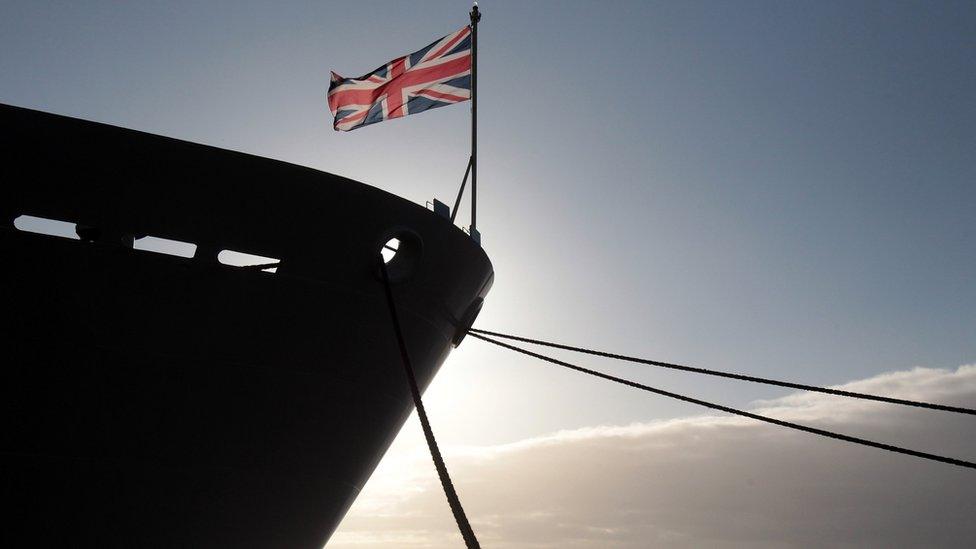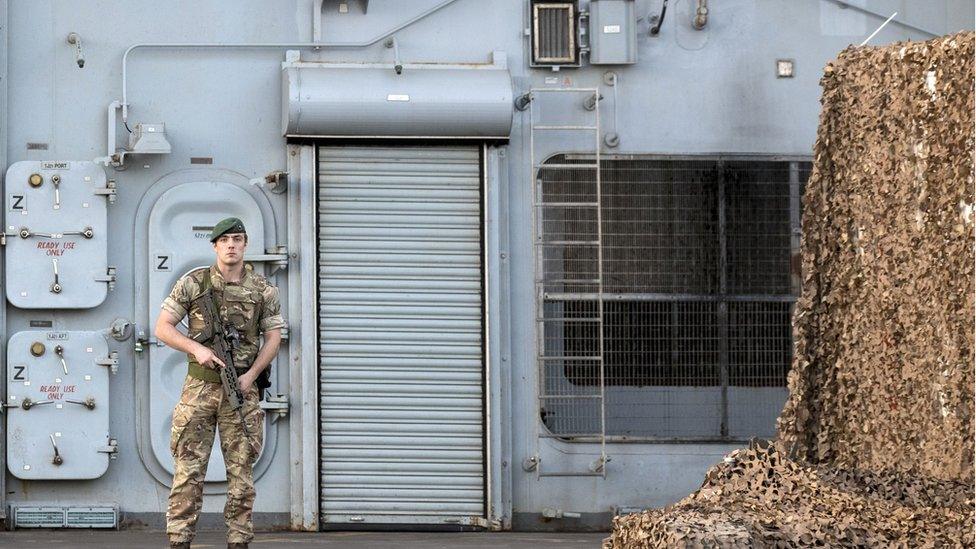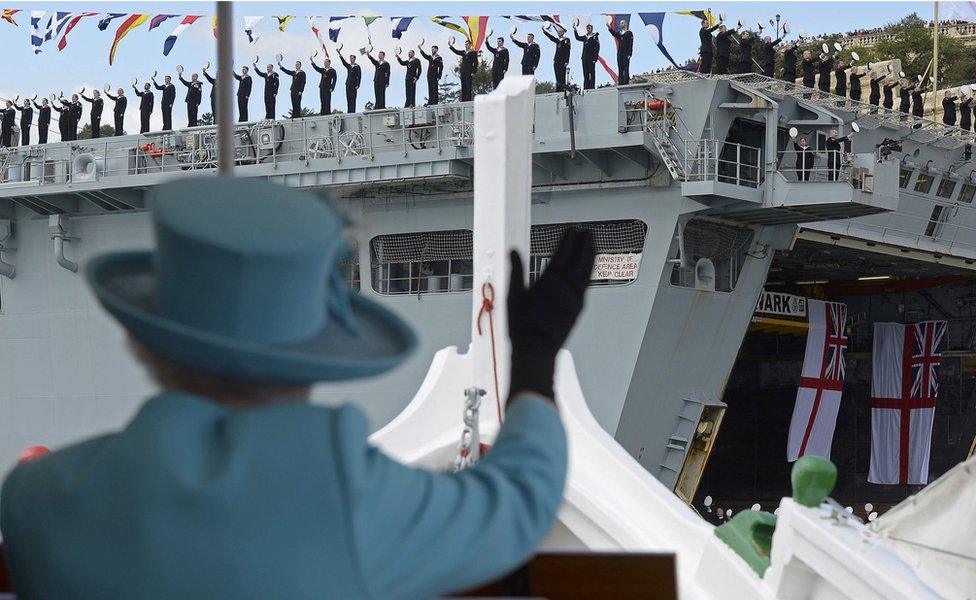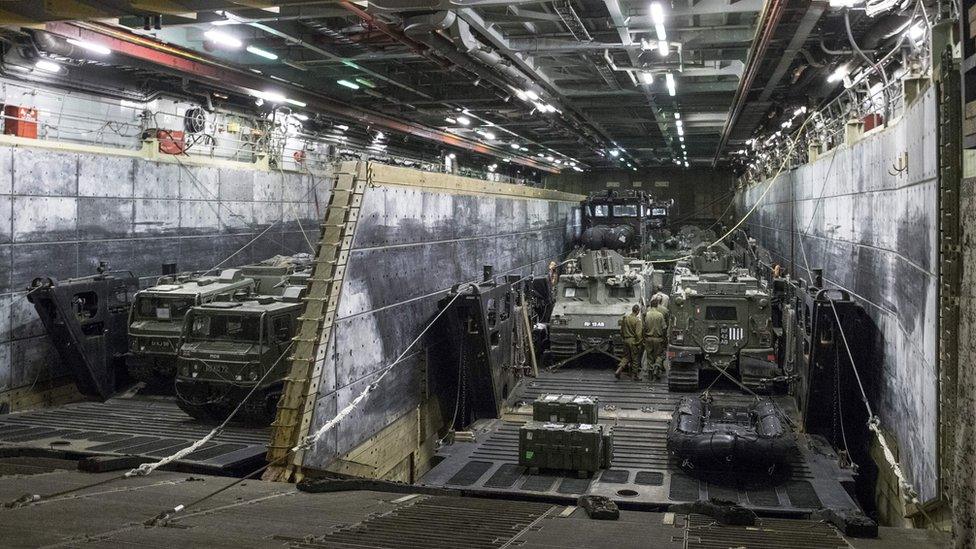Royal Navy could lose 'fight on beaches' ships in planned cuts
- Published
- comments

The Royal Navy could lose its ability to assault enemy held beaches, under plans being considered in the Ministry of Defence, BBC Newsnight understands.
Two specialist landing ships - HMS Albion and Bulwark - would be taken out of service under the proposals.
The plan - part of a package of cost-cutting measures - has caused alarm among senior Royal Marine officers.
The MoD told the BBC that no decisions have been made yet and that discussion of options was "pure speculation".
It is understood the head of the Royal Navy, Admiral Sir Philip Jones, formulated the move as part of a package designed to balance the books and free up sailors for the service's two new aircraft carriers.
Critics say the proposal would deprive the Royal Marines of its core mission.
Among other cuts envisaged are a reduction of 1,000 to the strength of the Royal Marines and the early retirement of two mine-hunting vessels and one survey vessel.

A senior Royal Marine officer blamed the introduction of the new carriers for exacerbating the senior service's financial and manning problems.
He told the BBC: "This is the worst procurement decision of the past half century - that's what the Royal Marines are being sacrificed for."
The proposed cuts are part of a raft of "adjustments" being considered by all three services - the Royal Navy, the Army and the Royal Air Force - as the Ministry of Defence struggles to balance its books.
The Royal Air Force could slow down orders of its new F35 fighter, and the Army could lose dozens of helicopters as part of their efforts towards the same goal.
In 2015 there was a Strategic Defence and Security Review, external, a paper intended to act as a blueprint for the coming five years.
However the depreciation of sterling has made big buys of foreign equipment more expensive and the armed forces have crammed the programme with too many projects, creating a hole in the budget.

The government announced "additional work to review national security capabilities" in July - a review by stealth - under the leadership of its national security adviser Mark Sedwill.
The proposed cuts to the Royal Navy have been put forward as part of this exercise.
Under the 1997 defence review, a group of ships was created to improve the UK's ability to land its commando brigade, even in the face of opposition.
The helicopter carrier Ocean, two specialist landing ships - Albion and Bulwark - and four logistic support ships were to be acquired to allow the 5,000 strong force to continue performing operations such as the 1982 Falklands landing, or the one on the Faw peninsula during the 2003 Iraq conflict.
With the retirement of HMS Ocean already announced, and the new plans to lose the two landing ships, the Royal Marines' ability to use landing or hovercraft to get ashore would be drastically curtailed.
In recent years, as an economy measure, the Royal Navy has only been crewing Albion or Bulwark alternately - they are big ships, each requiring a complement of 325.

While the government has dubbed 2017 "the Year of the Royal Navy" and emphasised its commitment to a new national shipbuilding strategy, observers at the MoD noticed that this blueprint contained no commitment to renew the amphibious warfare fleet.
The service is already committed to putting its two new carriers into service, replacing Trident, buying a new class of hunter-killer submarines, and two new types of frigate.
"The Royal Navy has got us into this mess", said a senior MoD figure, referring to the department's budgetary black hole, "so it's up to them to take the pain necessary to get us out of it".
With budgetary responsibility devolved to service chiefs, it fell to the head of the Navy Admiral Sir Philip Jones, to come up with proposals for how he could run the fleet within the financial and personnel limits he has been set.
Watch Mark Urban's report on iPlayer.